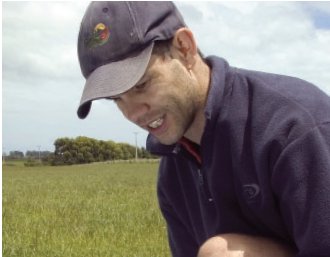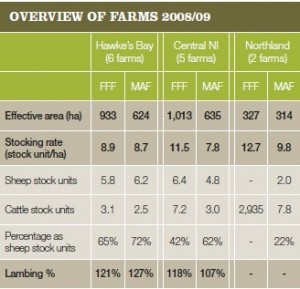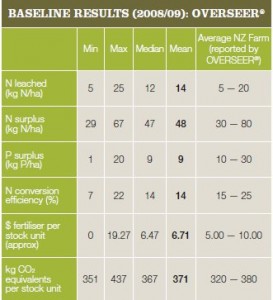You must be logged in to post a comment.
Archive
 Dr Jayson Benge – Soil Scientist, The AgriBusiness Group
Dr Jayson Benge – Soil Scientist, The AgriBusiness Group
New Zealand is moving into an exciting new agricultural space that looks to improve the previous farming model – one that struggled under a cloud of environmental strains, extreme weather patterns, higher costs, higher energy use and a new, more productsavvy, global consumer.
The Farming for the Future Research Programme is focused on finding ways to future-proof New Zealand’s natural advantage by asking:
- How can farming systems operate more ecologically efficiently and sustainably, with fewer/different inputs?
- What input savings and environmental benefits can be gained while maintaining or increasing production?
- How can we better understand the outcomes of lower nutrient input on sheep/beef farming systems and in particular those which utilise Hatuma Dicalcic Phosphate®?
Since 2009 the Farming for the Future Research Programme has been measuring the outcomes on 13 lower-input North Island hill country sheep/beef farms, Farming for the Future Research Programme – an Update most of whom have already been farming this idealism successfully for many years.
Each year, independent scientists and consultants from The AgriBusiness Group (www.agribusinessgroup.com) have undertaken the following:

- Comprehensive soil and pasture quality assessments (including soil biology
- Annual farmers’ interviews on farm physical attributes, management inputs, production and financial data captured and analysed
- Gauging environmental outcomes using Overseer®
- Comparison of farm outcomes against available local or national benchmarks as well as findings from the ARGOS project (www.argos.org.nz)
- Detailed reports written with considerable input from soil scientist Peter Carey (Land Research Services Ltd).
While the objective is to monitor the properties as long as possible to build a robust set of data for assessing the performance of farm inputs such as fertilisers, the first chapter of monitoring will end in 2012. At that point three years of monitoring will be reported on. However, some preliminary indications have been:
Production overview
- Generally the farms in this project were, on average, larger than most with more stock units per hectare for their respective regions (according to Meat and Wool NZ regional data).
Fertiliser inputs

- It’s accepted that many of the non-renewable resources used in day-to-day farming such as rock phosphate and fertilisers with a high fossil energy content will become more expensive and scarcer in the future. Phosphorus and sulphur are the major nutrient inputs on North Island sheep/beef farms and farms studied here have all applied less of these nutrients than the reported typical values for the regions each farm was in. With the exception of the one farm in Northland, which applied sulphate of ammonia, the farms here did not apply any significant amounts of nitrogen nor did they apply any potassium (to their pastoral blocks). The main fertiliser inputs on many of the farms were dicalcic phosphate blends and lime.
Meat Production
- Generally the average total meat production from the farms in this project for the 2008/09 and 2009/10 seasons was similar to their respective Fertilis er inputs regional averages.
Predicted environmental impacts (from OVERSEER®)
- Nitrogen leaching and N surplus values were largely within the average national ranges reported by OVERSEER®; N surplus values tended to be towards the lower end of the range.
- Phosphorus surpluses were lower than the OVERSEER® average range reflecting the lower amounts of P added to these farms.
Acknowledgements:
- The Farming for the Future Research Programme is supported by Hatuma Dicalcic Phosphate (NZ) Ltd.
- The Resilient Farming Alliance – A diverse group of like-minded individuals made up of farmers and representatives from industry, the scientific community and Hawke’s Bay Regional Council, as well as former Parliamentary Commissioner for the Environment, Dr Morgan Williams, and former Hawke’s Bay Regional Council Chairman, Ross Bramwell, who was a recent recipient of a New Zealand Order of Merit for services to agriculture. The group oversees and guides the Farming for the Future Research Programme to ensure the programme is reaching its objectives.
- The farmers involved who have graciously offered their properties as monitor farms.


 520 Maharakeke Rd, Waipukurau
520 Maharakeke Rd, Waipukurau

 0800 80 65 65 /
06 858 8567
0800 80 65 65 /
06 858 8567 06 8588018
06 8588018
Leave a Reply